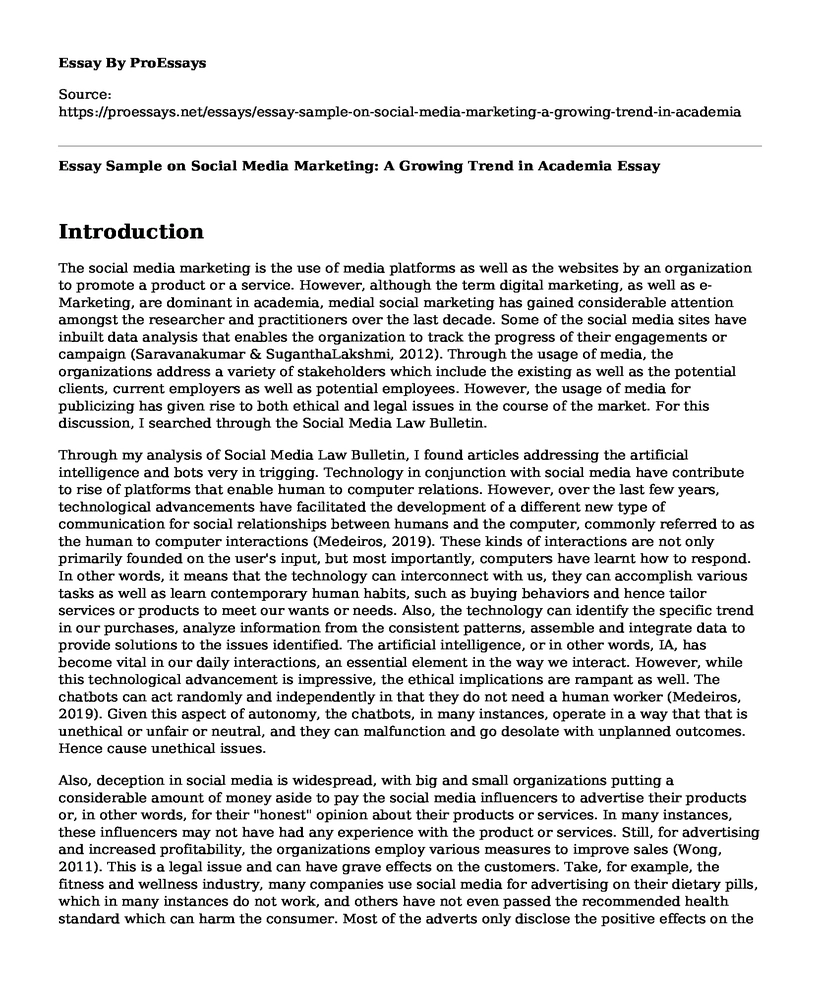Introduction
The social media marketing is the use of media platforms as well as the websites by an organization to promote a product or a service. However, although the term digital marketing, as well as e-Marketing, are dominant in academia, medial social marketing has gained considerable attention amongst the researcher and practitioners over the last decade. Some of the social media sites have inbuilt data analysis that enables the organization to track the progress of their engagements or campaign (Saravanakumar & SuganthaLakshmi, 2012). Through the usage of media, the organizations address a variety of stakeholders which include the existing as well as the potential clients, current employers as well as potential employees. However, the usage of media for publicizing has given rise to both ethical and legal issues in the course of the market. For this discussion, I searched through the Social Media Law Bulletin.
Through my analysis of Social Media Law Bulletin, I found articles addressing the artificial intelligence and bots very in trigging. Technology in conjunction with social media have contribute to rise of platforms that enable human to computer relations. However, over the last few years, technological advancements have facilitated the development of a different new type of communication for social relationships between humans and the computer, commonly referred to as the human to computer interactions (Medeiros, 2019). These kinds of interactions are not only primarily founded on the user's input, but most importantly, computers have learnt how to respond. In other words, it means that the technology can interconnect with us, they can accomplish various tasks as well as learn contemporary human habits, such as buying behaviors and hence tailor services or products to meet our wants or needs. Also, the technology can identify the specific trend in our purchases, analyze information from the consistent patterns, assemble and integrate data to provide solutions to the issues identified. The artificial intelligence, or in other words, IA, has become vital in our daily interactions, an essential element in the way we interact. However, while this technological advancement is impressive, the ethical implications are rampant as well. The chatbots can act randomly and independently in that they do not need a human worker (Medeiros, 2019). Given this aspect of autonomy, the chatbots, in many instances, operate in a way that that is unethical or unfair or neutral, and they can malfunction and go desolate with unplanned outcomes. Hence cause unethical issues.
Also, deception in social media is widespread, with big and small organizations putting a considerable amount of money aside to pay the social media influencers to advertise their products or, in other words, for their "honest" opinion about their products or services. In many instances, these influencers may not have had any experience with the product or services. Still, for advertising and increased profitability, the organizations employ various measures to improve sales (Wong, 2011). This is a legal issue and can have grave effects on the customers. Take, for example, the fitness and wellness industry, many companies use social media for advertising on their dietary pills, which in many instances do not work, and others have not even passed the recommended health standard which can harm the consumer. Most of the adverts only disclose the positive effects on the dietary pills and not the adverse effects, which are critical effects on the user.
Conclusion
In the fitness industry, they make use of the chatbots as well as social media influencers (Wong, 2011). In the case of the chatbots, most of the organizations have no idea the kind of ethical issues that the use of bots can expose them to, however in the case of deception to make the profit they are aware. The use of social media for advert can hence expose the business in this industry to laws suits in the future.
References
Medeiros, M. (2019). Chatbots gone wild? Some ethical considerations | Social Media Law Bulletin. Social Media Law Bulletin. Retrieved 14 March 2020, from https://www.socialmedialawbulletin.com/2017/10/chatbots-gone-wild-ethical-considerations/.
Saravanakumar, M., & SuganthaLakshmi, T. (2012). Social media marketing. Life Science Journal, 9(4), 4444-4451. Retrieved from https://www.researchgate.net/publication/293285713_Social_Media_Marketing
Wong, A. S. (2011). Ethical issues of social media in museums: a case study. Museum Management and Curatorship, 26(2), 97-112. doi: 10.1080/09647775.2011.566710
Cite this page
Essay Sample on Social Media Marketing: A Growing Trend in Academia. (2023, Apr 24). Retrieved from https://proessays.net/essays/essay-sample-on-social-media-marketing-a-growing-trend-in-academia
If you are the original author of this essay and no longer wish to have it published on the ProEssays website, please click below to request its removal:
- Marriage Counselor Episode on the Andy Griffith Show
- Taken Should be Rated R Essay
- The Louvre Essay Example
- Unified Vision of Graphic Design
- Movie Analysis Essay on Tall Woman and Short Husband
- Movie Analysis Essay on Giants and Toys: The Rise of Corporate Idol Culture in 1950s Japan
- Tesco's Internal & External Conflicts: A Case Study







